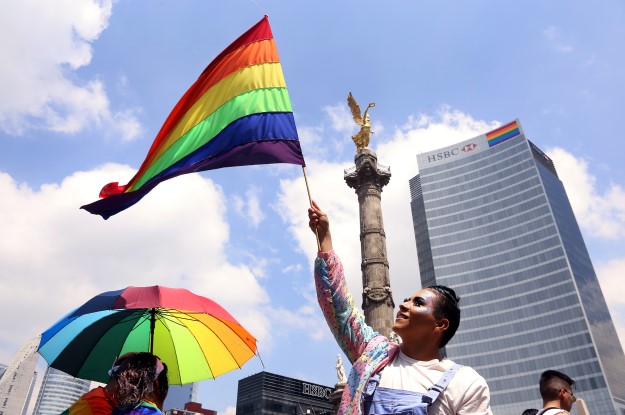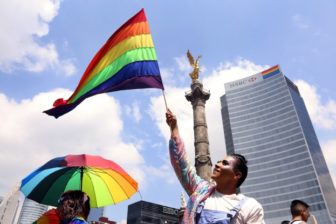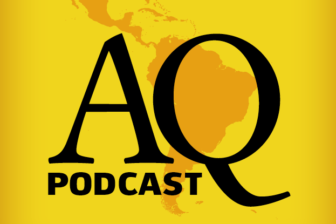MEXICO CITY – Mexico officially recognized the International Day Against Homophobia, Transphobia and Biphobia for the first time last year. On May 17, 2019, I spoke at President Andrés Manuel López Obrador’s morning press conference on the progress Mexico has made supporting LGBT rights, and on all the work left to be done.
A lot has happened since then. COVID-19 has largely put the LGBT agenda on hold. Gay pride parades and this year’s May 17 commemoration were pushed online. But while the LGBT community continues to view AMLO, as the president is known, with skepticism, the truth is that his time in office has coincided with unprecedented progress for LGBT rights. That progress can continue, both while we fight this pandemic and once things return to some kind of normal.
To do that, it is important to recognize where the LGBT movement has been, what is yet to be done, and what to expect from the current government.
AMLO and diversity
López Obrador has long had a trying relationship with Mexico’s LGBT community. As mayor of Mexico City from 2000-2005, he stood by as civil union legislation languished for five years without his support in the local congress. It wasn’t until after López Obrador left office that the bill was passed. Running for president in 2006, López Obrador suggested that LGBT rights should be decided by public referenda, a position that hasn’t changed in the last 12 years.
In 2009, Mexico City went a step further than civil unions, approving Mexico’s first same-sex marriage law, dubbed the David Razú initiative after the legislator most responsible for making it happen. Debate lasted only a couple of months. Decades of work by LGBT activists, four years of civil union legislation and support from then-Mayor Marcelo Ebrard helped put the city at the vanguard of what would become an increasingly national LGBT rights movement.
By contrast, AMLO continued to keep those rights at arms length. By the time he sought the presidency again in 2012, marriage equality had been the law in Mexico City for three years. And yet, the most prominent leftist politician in Mexico still thought public consultation was the right way forward on same-sex marriage.
The road traveled
The institutionalization of Mexico’s LGBT movement began at least four decades ago. But it is only only since the beginning of the 2000s that substantial progress has been made on the legislative front.
Four presidents have governed Mexico in that time, each with a clear position on LGBT rights.
Despite coming from the conservative PAN party, Vicente Fox (2000-2006) was no enemy of the LGBT community. He never opposed civil unions, and allowed debate on the need to fight discrimination to move forward while he was in office. This culminated in the creation of the National Committee to Prevent Discrimination in 2003.
By contrast, Felipe Calderón’s administration (2006-2012) was one of resistance to the gay rights movement. Calderón launched a legal fight against the advancement of marriage equality in Mexico City (though he lost in the Supreme Court), and denied recognition of social rights to LGBT people. On May 17, 2010, Calderón’s government decreed a “National Day for Tolerance and Respect for Preferences,” an offensive euphemism for the LGBT community that failed to use the internationally recognized name for the commemoration.
Enrique Peña Nieto (2012-2018) changed this policy. A member of the PRI party, Peña Nieto and LGBT allies worked to gradually push the rights movement forward. On May 17, 2016, Peña Nieto invited LGBT activists to the presidential residence to officially recognize the first National Day Against Homophobia and to support a package of legislation to advance LGBT rights. Peña Nieto’s initiatives drew the ire of the National Front for the Family, an anti-rights coalition that brought hundreds of thousands of people onto the streets in protest. As a result, PRI congress members broke with the president and froze the pro-rights legislation.
Then came 2018. AMLO ran for president with help from a political coalition that included the evangelical PES party, which, along with López Obrador’s repeated offers to put LGBT rights to a referendum, caused concern among activists as the campaign unfolded. In response, the Mexican LGBTTTI+ Coalition was formed to push a pro-rights agenda among the presidential candidates. López Obrador and his team were presented with a series of commitments to promote LGBT rights if elected – and they signed on to every single one.
That, in itself, was a sign of progress. And it came thanks to hundreds and thousands of LGBT activists, from Nancy Cárdenas (considered the mother of the movement) to a new generation that has worked to create a more open and respectful environment for sexual diversity. In person or online, May 17 was a day to give thanks for that activism – and to reflect on what comes next.
What’s been done, and what’s left
Since May 17 last year, four state congresses (all with AMLO’s Morena party either in the majority or with a strong degree of influence) have voted to recognize same-sex marriage, while one state has advanced the right through the courts. Another six have seen same-sex marriage initiatives lose narrow votes, with activists quickly presenting new initiatives in state legislatures.
Meanwhile, seven states in that time have recognized gender identity rights, whether through legislation or through the courts. Ten of Mexico’s 32 states (including Mexico City) now support gender identity rights, while 19 have legalized same-sex marriage.
A Supreme Court mandate means that the remaining states are obliged to legislate the issue. Morena’s majorities in most state legislatures, along with support from the PRI, PRD, Citizens’ Movement, Workers’ Party and Green Party should make the recognition of LGBT rights a reality nationwide. And in 2019, Ebrard (now AMLO’s secretary of state) announced that Mexican consulates worldwide would recognize same-sex marriage. Mexico has also ratified multilateral agreements protecting LGBT rights.
In health care, Mexico’s government has worked in the last two years to improve access to more current anti-retroviral treatment for people living with HIV. This new HIV paradigm, as well as efforts to negotiate better prices for imported pharmaceutical treatments, represent an essential correction to the previous state of affairs in which those living with HIV were left with only out-of-date treatment options, and Mexico paid the highest price in the Americas for anti-retroviral treatments.
Despite serious problems related to treatment availability and supply, this new paradigm started to become a reality in May of last year. The health department and the Mexican social security agency (IMSS), the two public institutions that most widely treat people with HIV, have begun migrating thousands of people with HIV from the out-of-date Atripla regimen to Biktarvy, which has a lower failure risk and leads to fewer side effects than other treatments.
This is an unprecedented and important change for Mexico. Never before have IMSS and the federal health department, which have often clashed on this and other issues, worked so closely to a common goal. Meanwhile, according to Mexico’s treasury department, Mexico is now saving 52% on the cost of anti-retroviral imports.
All of this is to be celebrated. But there are still thousands of people with HIV in Mexico using out-of-date treatments. Likewise, 13 states have yet to pass same-sex marriage legislation, and 22 have yet to recognize gender identity rights. Meanwhile, violence related to the war on drugs continues to affect the LGBT community in unique and often hidden ways.
The pandemic
The coronavirus pandemic has put efforts to address these and other issues on hold. An attempt to start a national PrEP HIV prevention program has been delayed, and public clinics are now less able to provide adequate attention to HIV patients. Hormonal treatments for trans people have been interrupted.
In the Senate, legislators from Morena, the Green Party and Citizens’ Movement were working to approve a civil society proposal that would have prohibited so-called conversion therapy when the pandemic hit. Other pending pieces of legislation would have provided social rights for LGBT people in the IMSS system and addressed specific punishments for hate crimes, which increase every year and especially affect the trans community.
Once the imperatives of the coronavirus pandemic have passed, all of these efforts need to be renewed. In the meantime, LGBT activism has moved from the streets to the internet. May 17 commemorations were held entirely online. But reaching vulnerable members of the community has been made far more difficult.
Iván Tagle, the director of YAAJ México, an advocacy group, says instances of young members of the community facing the possibility of homelessness has risen five-fold since the pandemic began. Alex Orué, director of It Gets Better Mexico, says the organization has had to make its emotional support line, which used to run once a week, available every day. Other community members describe having had to reveal their HIV status to employers, and losing their jobs as a result. Jaime Montejo, an HIV activist who helped provide sex workers with basic goods to get through the outbreak, recently died of COVID-19.
Conclusion
All of this has put pressure on López Obrador’s government. His handling of the crisis has been called into question at home and abroad. Even before the crisis, his government was showing signs of fatigue after a year and a half in office. The LGBT community has long doubted whether López Obrador and his party could be counted on to support their rights.
But AMLO’s time in office has in fact seen real progress on important issues to the community, sometimes with support from the president and other times in spite of him. Morena still counts anti-rights legislators within its ranks, and the president’s rhetoric on gender issues misses the mark more often than not. But the LGBT community has more allies in the Cabinet and in Congress than ever before.
Anthony Fauci, who heads the U.S.’ coronavirus response, recently compared the challenges of COVID-19 to those faced by the LGBT community during the HIV pandemic in the 1980s. Fauci said that the community faced those challenges with “incredible courage and dignity and strength and activism.”
Mexico’s LGBT movement continues to show that courage. Mexico will not be a more fair place until the dignity of the community is taken as a given. AMLO’s self-proclaimed fourth transformation of Mexico must continue to strengthen LGBT rights – during and after the pandemic – or it will be no transformation at all.







